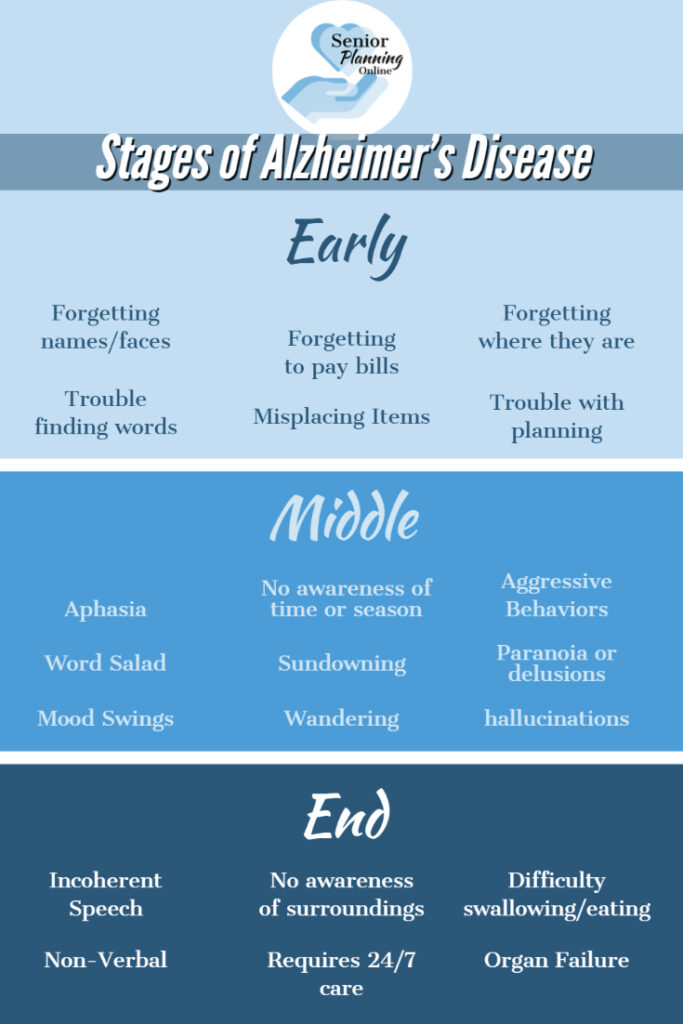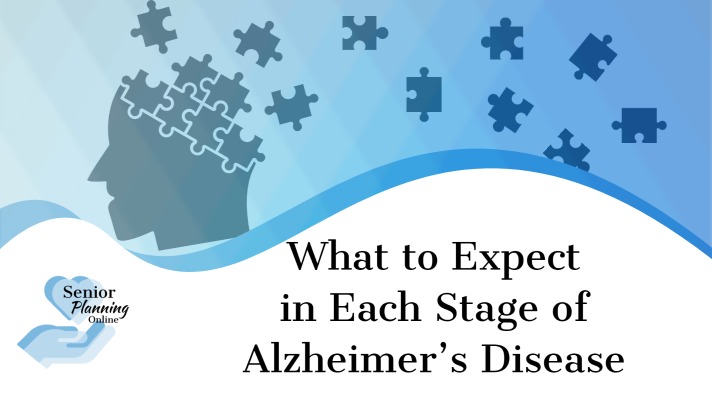Over the years there have been a few different models of how the progression of Alzheimer’s disease takes place. Experts and researchers describe the progression of the disease in stages.
However, I have seen some controversy on how the “stages” of Alzheimer’s disease are talked about.
I have seen a 3-stage model, a 5-stage model and a 7-stage model. It seems that the different stages describe the same pattern of symptoms, they just might be more detailed.
If you haven’t checked out the post on How Alzheimer’s Diseased Affects the Brain, make sure you do!
This post is going to go through the 3-stage model of the Alzheimer’s disease process. Hopefully this can help guide you in figuring out which stage your loved one may fall into. A caveat, everyone is different, so sometimes you might see some overlap. Take this as a general guide.
What Are the Stages of Alzheimer’s Disease?
The Alzheimer’s Association describes the disease process into 3 main stages: Early, Middle and Late. Let’s go into some more depth of these stages.
The average life expectancy of someone diagnosed with Alzheimer’s Disease is usually between 4-10 years. Depending on how early the disease is found and diagnosed can change how long someone lives with the disease. Everyone is different, so some people may live shorter and some longer.
When I worked as the social worker for an Alzheimer’s Nursing Home, I had a couple of individuals live with the disease for 20 years!
People diagnosed with Alzheimer’s may experience the different stages at different rates because we are all different. Sometimes the stages can overlap as well.
Early Stage of Alzheimer’s
Sometimes this is called the “mild” form of Alzheimer’s. A person may function at a high capacity. They seem normal and may be still very independent.
In this stage may have difficulty with the following:
- Forgetting where they are or what they were doing
- Misplacing objects
- Difficulty remembering names of new people and sometimes loved ones
- Having a hard time retaining new information
- Difficulty with finding the right word for something
- They may be experience difficulty paying bills or planning their finances
In my experience, I found that people who start to experience these things might start to have more anxiety or may also be embarrassed. They often won’t say anything to anyone and try to cover up these difficulties. In my opinion, this is one of the reasons Alzheimer’s Disease is missed or diagnosed way later than it could have been.
Middle-Stage Alzheimer’s
This is often described as the “moderate” stage of Alzheimer’s Disease. In my personal and professional opinion, this is the stage when family start to realize that something “isn’t right” with their loved one. They start to notice the following symptoms:
- Difficulty with language, confusing words or speaking a string of words that don’t make sense (word salad)
- Are confused on their age, time and personal history
- Many people may think they are still in their 20’s, 30’s or 40’s and talk about experiences they have had in those years as if it was happening now.
- Experience more mood swings such as sadness, depression, and angry
- They are likely experiencing these changes in mood because they are having a difficult time communicating their needs and wants.
- Being unaware of the season or time of day
- Sometimes they will dress themselves or pick out clothing that does not match the current season or weather.
- Or they may experience sundowning — Sundowning is when an individual experiences difficulty sleeping. Their biological clocks turn upside down. They become more restless and active in the afternoon and evening. And are sleepier in the morning and midday.
- They might start to wander. Leaving the house and become lost
- This can be especially concerning if they are doing this at night because of the changes in their sleep patterns
- They have more changes in their behavior:
- Become more physically and verbally aggressive
- Experience hallucinations
- Have delusions and paranoia – Many people become paranoid and have delusions about their money and finances
- Have repetitive behaviors like always fidgeting with something in their hands, tearing up paper, folding laundry over and over, washing the same dish over and over.
- Saying the same sentence or phrase repeatedly (ie “I want to go home” or “help me”)
Late-Stage (Severe)
Their cognition and memory continue to decline. Usually at this point they require help with everything and need 24/7 supervision and care. The changes they experience include:
- Continued difficulty communicating. Speech is either incoherent or they become non-verbal
- They have no awareness of their surrounds or the people that are around them
- The disease starts affecting the part of the brain that controls voluntary and involuntary movements of muscles and organs.
- They may require a wheelchair or become bed bound
- Have difficulty feeding themselves or swallowing; requiring someone to feed them for every meal
- Become more susceptible to illness and infections
- Often they may experience an infection that may cause death before the disease itself does

Additional Resources About Alzheimer’s Disease
Keep out an eye for more posts on the blog about Alzheimer’s Disease and Dementia. I plan to go more in depth with the stages of Alzheimer’s disease, how to handle behaviors and help for caregivers.
If you are needing more immediate help and information, contact the Alzheimer’s Association 24/7 Hotline at 800.272.3900 or visit www. Alz.org
Check out the Alzheimer’s Project & Dementia 360


No responses yet